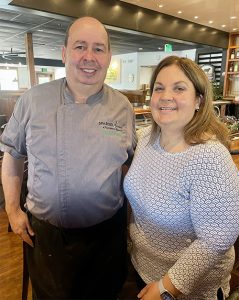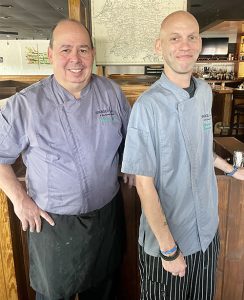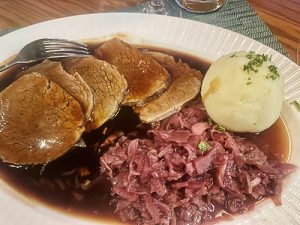By Cathy DeDe, Chronicle Managing Editor
Spargel on 9, the German restaurant that opened last December in the former Outback Steakhouse in Queensbury, is in the midst of its first Oktoberfest celebration — but chef-owner Christian Raeth (“Räth” in German) wants you to know this is not the cuckoo-clock oompah style typical of German fare in America.

“What I mean by that is, not Disneyland, not Epcot. You don’t run around in lederhosen, we don’t have ‘humma-humma’ music blaring through the dining room; we don’t do the chicken dance on your birthday. Just concentrating on great service and great food. That’s where we want to hang our wagon on….
“Our signature dishes are definitely our German classics, starting from our Sauerbraten, where we only use certified Angus beef prime.
“At one point, our red cabbage was actually trending on Yelp because so many people talked about it. It’s a very elaborate process. It doesn’t come out of the can; we do it fresh. We have to marinate it with so many different ingredients overnight, and then we cook it the next day. Then there’s our homemade brats, from a family recipe that hasn’t changed in, I think, 100 years. We hang our nail on that.”
They serve German Weihenstephaner beers only, “from the oldest brewery in the world, since 1040.”
And he said, “People go crazy for” the herring appetizer.
He said the restaurant’s name Spargel refers to white asparagus, “that Germans go crazy over” in its brief spring season.
“From our starting day, right out of the gate,” says Chef Raeth, “we were crazy busy, maybe a little bit too busy, because we do have 230 seats, and 40 employees. As much as you train prior, nothing prepares you for when you actually open up. Not everything was smooth, but what I looked at was how awesome it was for 40 strangers just to come together and gel, and form a team….
“It’s a very open discussion we have once a week: What works, what doesn’t work. They’re all very important members of this team. They make this place.
“I can dream of whatever foods I want, But if I don’t have staff members like (Executive Chef) Cheyenne Wolf, like Heidi (Faulkner) who runs front of house, or I don’t have my wife Courtney behind me who takes so much pressure off me doing all the business stuff, even my dishwasher — she’s 60 years old, and she’s a monster.”
Chef Raeth’s quick bio: “Born and raised in Germany, [I] started my apprenticeship in 1984 in my hometown of Erlangen,” north of Nuremberg.

Then “I traveled a little bit, worked in France, Italy, Switzerland, in hotels and resorts and fine dining establishments.”
He said he first came to the U.S. to visit his older sister in Schenectady.
“I was thinking jeez, there’s got to be something more to this country than hamburgers and hot dogs. That’s what we think in Europe, that’s all the Americans eat, and listen to country music.”
He said he got a job as sous chef at Albany Country Club in Voorheesville, went home to take care of his ailing father, then returned here in 2000, “for good.”
He worked at Pumpernickel’s Restaurant in Bolton, with his uncle Hans-Jürgen Winter, followed by a string of chef gigs, including as executive chef at Fort William Henry, then 13 years with Sysco Foods.

When 40 Oak closed, “I basically just called the Realtor and said, you don’t have to put this thing on the market. This time, it’s mine. It was a very brief conversation, and it was done in no time.”
“My uncle had one of the biggest cuckoo clocks in the States,” Chef Raeth says of Pumpernickel’s.
“For me, that’s a nice thing, but nothing to do with the restaurant.
“Now it’s October, the one time we’re gonna go a little bit crazy. We are playing the Oktoberfest music. We have German bands coming on the weekends, German beer games, beer stein slamming, the hammering of the nail in the wall. We have a lot of fun with it.
“But after that, we go back to being a restaurant where you can have your roast pork, or a very elegant dinner, and that’s what I’m trying to showcase….
“We are very prep heavy, because it’s not like I can import all that stuff. A lot is made from scratch every day. That’s why we’re here at nine in the morning. It shows, and I’m proud of that.”
“I just love having some raw ingredients, to use your knowledge and imagination, put something on the plate and make another person smile. How much better can you get, right? That’s what I love to do, and that’s what I try to instill with my crew. You’re gonna have fun then, and it becomes a career, not just a job.”
“We do all our classics, but then we have some really interesting dishes, like we had short rib both ways, grilled and braised, and it’s actually delicious.”
Of his herring appetizer, Chef Raeth says, “This is where the benefit comes in of traveling so much. You always pick up something. One of the sauces for our Schnitzels is our paprika sauce, [a recipe]that hasn’t changed since 1800-something, I learned from my apprenticeship.”
He says, “People actually go nuts over our salads, the way we do them. That’s my grandma’s dressing. It’s a four-ingredient dressing, but people love it.”
He’s big on seasonal German favorites, like goose for St. Martin’s Day. “I found there are so many Germans around here, missing that the things they grew up with,” says Chef Raeth.
On November 29, “I’m going completely on a limb,” with a “Frühschoppen” festival inspired by hog butchering celebration, and very traditional foods. The people who know what it is, they love it. I just want to see if there’s any interest,” enough reservations to pull it off.
Chef Raeth says he wants to redefine what people think of German cuisine.
“Way up north, on the northern sea, there’s all kinds of fish running around, right? You go east, you got Poland coming in with their cuisine over thousands of years. Let’s not forget how old this European continent is, or how food travels.
“From the south, you’ve got Italy. Then you’ve got Austria and Hungary and France coming in. There’s so many influences on this cuisine, over hundreds and hundreds and hundreds of years.
“There’s a picture at the hostess station. It’s a map of Germany and the neighboring countries. So, the food has to come out of that box. If it’s in the box, it’s fair game.
“So, we had venison on the menu. We did rabbit. There’s wild boar. Believe it or not, we have an ocean. We have salmon right at the front door. We have flounders floating around, and the lobsters, the clams and oysters and the mussels. We eat that.”
Even pasta, he says. “We eat that. Wild mushrooms. We had chanterelles, foraged. People love it. The community has really embraced us….
“I’m going into the dining room every night. I talk to my customers, which is important to me, to separate us from every major chain restaurant down the street. I believe the customers want to know who the owner is.”
He laughs, “There’s always the person who used to be in Germany. They want to speak their three sentences of German with me. It’s fun.”
“Even growing up,” Chef Raeth says, “I always wanted my own place. It was always in the back of my head. When it finally came to fruition, to come up with the theme or the menu, that was the easiest of all things. I knew exactly what I wanted, and what I didn’t want.”
Why the name ‘Spargel on 9’? It’s about being asparagus-crazy
Chef-owner Christian Raeth says of opening his own restaurant, “The menu was done years ago in my head, It was just putting it on the computer.”
The name? “The easy way out would have been Queensbury Brau House: It’s in Queensbury. Must be German. There’s beer and there’s German food.
“But I want to break that mold, because now I’m in a box. You’re thinking brau house and music, chicken dance. You don’t think good food, or, what I consider good food.
“I wanted something that’s so unique to Germans. So, from mid-May to mid-June, the white asparagus season happens in Germany, and we go absolutely crazy over it.”
He said Germany doesn’t export white asparagus. What’s grown by German farmers is all used at home. Spargel sources it in-season fresh from Holland. Chef Raeth says he “wouldn’t think” of using frozen. — Cathy DeDe
How hungry soccer kid in Germany was propelled to be chef
“Growing up in Germany,” says Christian Raeth, “I was very much involved to playing soccer. I played in this semi-, almost professional league since I was 6 years old. In our summer breaks, we played soccer all day long.
“The owner of the sports club, I always begged him: Gunda, can you please cook something for lunch? One day he said, you know where everything is. Just cook yourself something.
“I was, like, 12 years old, in the kitchen, just opened up the refrigerator doors and threw stuff together, saying, oh, this is fun.
“That’s where the passion came from. Just the whole camaraderie of the kitchen. That’s what drew me to it.” — Cathy DeDe
Copyright © 2024 Lone Oak Publishing Co., Inc. All Rights Reserved
 Glens Falls Chronicle Serving the Glens Falls/Lake George region; Warren, Washington and northern Saratoga counties since 1980
Glens Falls Chronicle Serving the Glens Falls/Lake George region; Warren, Washington and northern Saratoga counties since 1980


